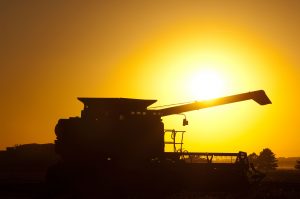As agriculturalists, we underestimate our power. We know our work is essential to the world. For roughly 12,000 years, our unique practice as farmers and ranchers has brought food, fiber, and construction to our societies. It truly is more than an industry when you think about it. It is also an art, a tie to practices based in culture and tradition.
Agriculture is so unique that it has the power to do what seems nearly impossible to achieve these days — the power to unite the people. But these days, we as leaders of agriculture seem to forget this power.
In a world so caught up in our money and livelihoods, we forget to appreciate, acknowledge, or even criticize our work.
We love and appreciate what we do, and so do many others. For many of us, it’s more than a job or field of study; it’s a lifestyle and way of life with deep values tied to generations of culture and tradition. We wouldn’t be who we are today without the experience agriculture brings into our lives.
But uh-oh, criticism. Probably everyone’s least favorite word, and it’s something modern day agriculture knows very well. As agriculturists, farmers, scientists, and foodies, we know the truth to many of the misconceptions that give agriculture a negative reputation. As communicators, we need to help clarify these perceptions.

However, we also need to be mindful that some of these criticisms come from a place of truth and personal experiences. As unfortunate as it is, there are communities of people who do not share the same passion, experience, and joy of what we do. Who are we to refute, deny, or gaslight these experiences?
Agriculture is a complex system. As leaders of this industry, we provide just about everything we use today. From the food on our tables, to the advancement of medicine, to the clothes on our back, agriculture provides it all for us.
Yet I can’t help but to think of all the ways some people feel divided by agriculture — and rightfully so. We can’t turn a blind eye to their reasons, their experiences, their livelihoods.
Denying their livelihoods and experiences with agriculture would not be too different from those who deny our experiences and knowledge in it, yet portray it in a negative way with their misconceptions.
We love our farmers, but we also love our farmworkers. The job could not be done without them. They make sure food leaves the fields and makes it onto our tables. Unfortunately, that food pipeline comes with a cost.
Farmworkers give up so much of their time and put in extraneous amounts of labor into their jobs. We try our best to acknowledge their work and remind them how much we appreciate them. But sometimes that just isn’t enough. The workers’ and their families’ relationship with agriculture can often be complex because they experience the hardships that come with being a farmworker in the United States.
The weather conditions and movement required to harvest crops such as strawberries and cilantro is back-breaking and exhausting … even dangerous sometimes. And while their job is to supply food to our tables, they struggle to support their families with food. This can lead to a “love-hate” relationship with the very process they’re so intimately connected to.
Social division in agriculture doesn’t always have to be deep and personal dealing with the livelihoods of people. Some of us are divided even over superficial topics, like the type of cropping system we use. Conventional vs. organic cropping systems, which one is more environmentally sound? Which one is the most economically feasible? Does using one over the other make you any less of a farmer?
The question of whether some of our farming practices are sustainable or not also has our community in debate. Is what we do still considered ethical when we aren’t sustainable?
These are just a few examples of social complexities in agriculture that divide and give people complicated feelings about the industry.

Food and agriculture has always — and should always — unite people, not divide them. As leaders of this industry, let’s change the division. Let’s take proactive measures to resolve the issues that divide us and those around us. Don’t forget our power to unite the people, and most certainly don’t forget to sustain that power.
I feel like we’ve been naïve in that way and haven’t embraced our power to its fullest potential. There’s always room for improvement.
Despite the misconceptions and criticism we may get for our work, remember that there are more people who appreciate us and love what we do. We should celebrate the power of unification that agriculture can truly bring.
Perhaps we should also embrace other divisive topics, like food sovereignty and rediscovering our links to food and the environment we all use. When we make food and agriculture accessible only to certain communities, many more are missing out on the opportunity to connect with the environment, take appreciation in growing their own food, and immersing themselves into the mechanisms of food production and distribution.
By doing this, we can rediscover our commonalities through the earth we share and the food we consume. Maybe then, many of the things that divide us in agriculture will become obsolete, if we all just pitched in together.
Which ways do you think agriculture can unite people? What other ways can you think of that divide us, and what can we do about that? What could we do with this power? I think the best solutions arise when we all think about something collectively. So let’s do that instead of turning a blind eye to these hardships. Let’s do better because I know we can.
What should we not do? Let’s not act like these experiences and reasons for divisions in agriculture don’t exist. Lets not sound uneducated and entitled. Let’s understand and be OK that not everyone will have positive feelings about our work. It is, however, on us to improve these hardships.
Saul Reyes serves as the 2022 American Farmland Trust Agriculture Communications Intern at AGDAILY, with a focus on helping to amplify diversity and minority voices in agriculture. An FFA alum, Reyes is now a student at California State University-Chico and is double majoring in plant and soil science and multicultural and gender studies, while minoring in intersectional Chicanx/Latinx studies and public relations. He can be found on Twitter @sreyes710.





